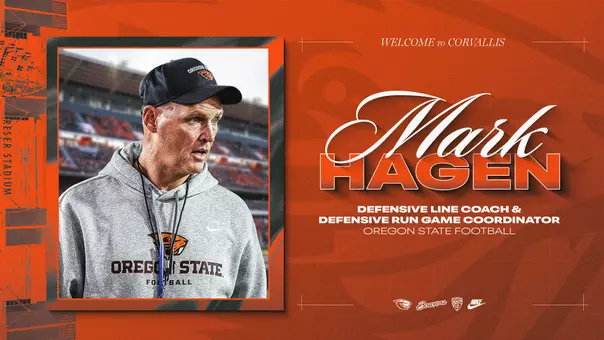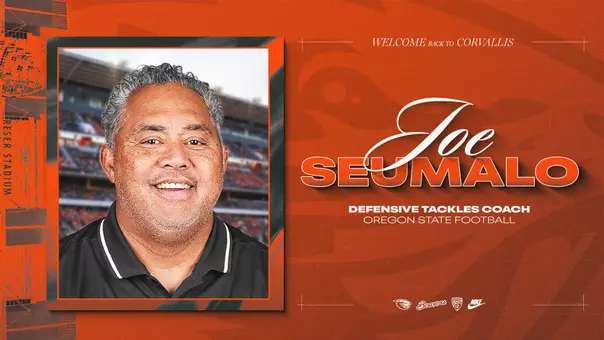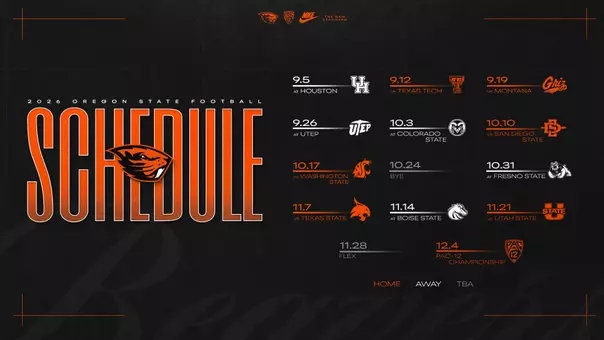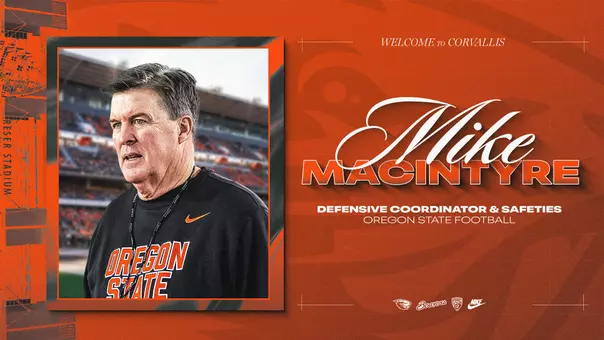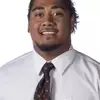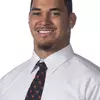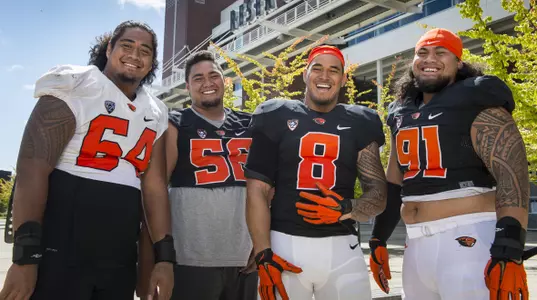
A Close Fraternity
August 28, 2015 | Football
By Brooks Hatch
OSUBeavers.com
They comprise one of the smallest and closest fraternities on the Oregon State football team.
Living thousands of miles from home and family in new surroundings in a different culture has forged incredibly strong bonds between OSU's four American Samoan players, who rely on each other daily to adapt and ultimately thrive nearly half a world away from their native Pacific Ocean island home.
“We miss our family every day,” redshirt junior defensive tackle Noke Tago said in describing the biggest challenge faced by the foursome. “We don't see them often, not like other players who get a chance to go home because they are from the states.
“It is sad for us but the thing is we have to get ourselves comfortable with each other, and have each other's back. We've created our own bond here as a family and a brotherhood that looks out for each other.
“We make it easier for us by creating our own family here. We get together, share our food, have chapel together, it reminds us of our chapel back home” in American Samoa, where family and God are the cornerstones of daily life.
OSU's four American Samoan football student-athletes are Tago; redshirt junior linebacker Rommel Mageo; redshirt sophomore offensive lineman Fred Lauina, and true freshman defensive tackle Elu Aydon. Tago, Mageo and Lauina are from Pago Pago; Aydon is from Leone.
They are all key components on the Beavers, who now feature more than 20 players and five coaches of Polynesian ancestry, one of the fastest-growing demographics in college football.
The Samoan football heritage runs deep. Approximately 30 American Samoans play in the National Football League and ethnic Samoan Junior Seau, who grew up in Southern California before playing at USC, was recently elected to the NFL Hall of Fame.
Pittsburgh safety and future NFL Hall of Famer Troy Polamalu was raised in Southern California and in Winston, Ore., but is also of Samoan ancestry. His cousin, Joe Polamalu, played for the Beavers in 1987-88.
“The kids from American Samoa are different from most Polynesian kids,” said defensive line coach Chad Kauha'aha'a, a Maui native who starred at Utah from 1993-96 before entering coaching.
“They come from a [remote] island with fewer luxuries than most of our Polynesian kids, who grew up in Hawai'i or in the states.”
Understanding that subtle difference is just one of the reasons the Samoan Beavers said having coaches of Polynesian ancestry – Kauha'aha'a, Kalani Sitake, Ilaisa Tuikia, Andrew Seumalo and Lyle Moevao – has given them a connection with the staff, even if those aforementioned coaches may be Tongan or Hawaiian, and not Samoan.
“We are all from different island countries but we are all Polynesian,” Tago explained. “The coaches have done a really good job of becoming part of our family.”
Added Lauina: “I like the way they bond with us. They have that Polynesian spirit. We're not all manly and tough, we show love,” and have a tender, empathetic side too. “That's why I'm happy to have these Polynesian coaches, they understand.”
Mageo said the Polynesian coaches can intuitively relate to where they come from, their culture, the importance of extended family, and other aspects of their heritage others might not grasp.
“That's the greatest thing, they care for you much more than as a player, they care for you as a person,” Mageo said. “They truly understand the Polynesian culture, how it's all about family and God, centered on those two things.

“Any person from home who comes in here, they don't get that homesick because they have people who are very similar to back home and they understand our culture.”
An example of that understanding was colorfully evident at OSU's football media day. The Polynesian players all wore their ielavalavas, a traditional sarong-like garment worn by those of Pacific Islander ancestry.
“That was a big deal, they completely understood” the reason why the players dressed that way on an important day, Mageo said. “They supported it, and it was a great thing.”
Aydon said he appreciates the “straight-up honesty” from the staff.
“They do not hide anything from you. That's part of the Polynesian culture. If you are falling behind they will be there to pull you back up. If you are doing something wrong or right, they will let you know.
“They have been there for our parents, not just as coaches but as guardians. They look out for the kids from the Islands, and everybody else as well.”
Kauha'aha'a said OSU provides a great atmosphere for Polynesians because of the diversity on the team and the large number of Polynesian coaches and administrators on the staff.
“There is a lot of support to help them feel comfortable, and it helps knowing the culture and their needs,” he said. “I know it's a good fit for those kids to be here.
“When we go into their homes their parents know it's not some guy who doesn't know what we are about. They know if they send their child with these coaches they will understand them, know how to treat them, and get them going in the right direction.”
Like most incoming freshmen, Aydon was homesick when he first arrived in Corvallis for summer conditioning and other orientation activities. Unlike many of his teammates, however, he couldn't simply hop in his car and head home to Oregon, Washington or California for some parental TLC and a home-cooked meal.
It's about 5,000 miles between Corvallis and his hometown of Leone, American Samoa. So, Mageo, Tago and Lauina stepped in to act as their own welcome wagon.
“They have been like my family, welcomed me with open arms,” Aydon said. “I miss home, but they comfort me and are there when I need them. I am very grateful for them and I'm thankful they are here for me.
“It has always been like that” in Polynesian life, he added. “We come from a very small island, with not many people. Seeing another Samoan, Tongan or Hawaiian, you know that bond is always there.
“You don't have to be blood-related” to be considered family, “and I really appreciate that about the Polynesian culture. The Polynesian family works together and we can give you what you need and what you want.
“Don't be scared, don't be afraid, we will be here with open arms and welcome you into our family.”
Not being able to see your family very often is one of several transitions that are more pronounced for the Samoans.
American food is vastly different than traditional, exotic-sounding Samoan foods such as kale moa (chicken curry), homemade vegetable soups, smoky barbeque, taro, yams, potatoes, oka l'a (fresh fish salad), panikeke lapotopoto (round pancakes), umu (oven-pit-baked food), keke pua'a (bao), sapasui (chop suey), fa'apapa (baked coconut bread), paifala (half-moon pies) and puligi (pudding).
“We are Polynesian and can eat anything,” Mageo said, laughing. “That was the best part, that's why we gain a lot of weight when we get here.
“At home we just eat one meal a day. To come here where we eat four meals a day, that's a gift.”
Driving, however, was something different altogether. There are only about 200 miles of paved road on American Samoa and the universal island speed limit is just 25 miles per hour.
“Back home you barely go past 30 or you get a ticket. Out here, cars are flying around,” Tago said. “Back home we always roll the windows down. Here it hurts your ears because the cars are moving so fast.
“My first time in the mainland it was scary how the cars were going so fast; it was a shock to me that they didn't get into accidents, how fast they were going. But you get used to it and now it's like nothing.”
Added Aydon: “The cars go so fast. It's cool to just sit in the car and watch other cars fly past you.”
Other surprises include snow, and trains.
“I had never seen snow before until my freshman year,” Lauina said. “I ran down from the dorm and jumped into the snow. I love the snow, I wish it would snow again.”
Aydon noticed the train tracks that intersect campus along Washington Way. He knew what they were, of course, but he'd never seen a live train before.
“When I saw a train pass by, it was a great scene,” he said.
Kauha'aha'a said American Samoans are “naturally built for the game” because they are strong, physical, and used to hard work. They also value education.
““It comes from their upbringing,” he said. “They don't head down to McDonald's or 7-Eleven to pick up something after school. They go to work on the farms to help support their families.
“Their parents support education and know that's the ticket to a better life. That's one of the things their families stress, that their child has the ability to play football and take advantage of the educational situation to benefit their lives.”
Mageo, Lauina and Noke were already in the program when the new coaching staff arrived in Corvallis this past December. However, Kauha'aha'a made it point to meet every family when he was recruiting Aydon to make sure they all knew the new staff understood their culture, and was committed to seeing their children succeed.

“Aydon's family is a big reason he came to Oregon State, because of the trust we built with his parents, James and Faay, and his aunt Mary,” Kauha'aha'a said. “They instilled their trust in me to make sure their son gets his education.”
About 95 percent of American Samoa's population (55,000) lives on Tutuila, the largest of the country's five main islands and two atolls. American Samoans are American nationals, but are not citizens unless one of their parents is a U.S. citizen.
They cannot vote in U.S. Federal elections, but are represented by a non-voting member of Congress. American Samoans have the legal right to live in the U.S. and can apply for citizenship after three months of residency by passing a test in English and civics, and by taking an oath of allegiance to the United States.
Tago said another big difference from Samoa is Corvallis's “peaceful” environment.
“There is peace for us,” he said. “Back home some people are always looking for trouble. Every time I talk to my mom I tell her I chose the right place.”
Added Mageo: “Where I am from some people are extremely prideful and they end up fighting. It's a pride thing. We are very competitive. It's not as peaceful as here.”
Not everyone makes it as far as Tago and Mageo, academic seniors on target to graduate next June, or Lauina, an academic junior. Mageo said the combination of homesickness and the tougher academics often make it too big of an obstacle to overcome.
“A lot of the people who played high school football who I looked up to, you see them at the corner store, they are not doing anything, just sitting around,” he said.
“I feel my people sometimes suffer from a small-island mentality, meaning they are just very comfortable where they are at.
“A lot of people come here, get homesick, and they go back. I want to try to change that. I want to tell my people back home that it's very possible” to step outside their comfort zone and succeed in a different environment.
“It has always been a dream of mine to play football. I'm grateful to be here. You can do whatever you want if you put your mind and if you put your heart into it.”
Lauina also said it was a dream come true when he received an OSU scholarship offer and a chance to totally change his life. He had been considering a career in the military, another popular option for Samoans.
“I thought, 'This is my chance,' ” he said. “Coming here, I had to change and experience a lot of new things that I had never been through, like the speed limit and the technology, and the time change.
“Now I've been here four years I'm adjusted to it and I like it. Now when I go back home I won't be able to adjust to my old ways,” he added, laughing. “It's a new beginning and a new start for me, and I like it.”



